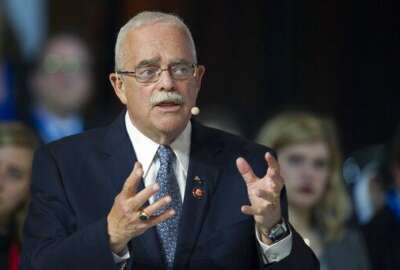

Hubbard Radio Washington DC, LLC. All rights reserved. This website is not intended for users located within the European Economic Area.
New chairmen and ranking members of the Senate Appropriations Subcommittee on Financial Services and General Government and the Homeland Security and Government...
Let’s take a quick trip back to the early 2000s when Congress passed and former President George W. Bush signed the E-Government Act of 2002 into law. Those were heady times. The internet (we still capitalized the “I” back then) was still new and the possibilities were endless. It was before the iPhone, before Facebook and before the gig economy.
The law created the E-Government Fund, authorizing a “whopping” $300 million to help agencies make federal online services more responsive and easier to use.
Those were times of hope and excitement for sure — $300 million was a lot of money back then.
Here we are 18 years later — the E-Government Act passed in December 2002 — and agencies continue to fight to get out from under an ever-increasing amount of technical debt to improve citizen services and address cyber vulnerabilities.
Despite the massive data breaches suffered at the Department of Veterans Affairs (26 million veterans affected in 2006) and the Office of Personnel Management (21.5 million federal employees and contractors affected in 2015), the COVID-19 pandemic pushing most federal employees to work from home and closing down in-person services, and the SolarWinds cyber attack, agencies are no closer to receiving significant and specific funding to develop, modernize and enhance their IT services.
But wait — there is renewed hope that the IT modernization boulder may finally reach the top of the hill. The Biden administration’s support and its request of $9 billion in the American Rescue Act, new leadership on key Senate committees and the technology success stories from the pandemic all point to an opportunity like never before.
“The pandemic has shown how technology can help. There is widespread acknowledgement of that even though there is not necessarily a deep understanding of how or why. There is a good wind in the sails,” said Trey Hodgkins, who has been part of the e-government debate since the 1990s and now is president of Hodgkins Consulting. “The economy and jobs are changing and that’s being driven by technology so we are getting momentum behind that and we didn’t have that before. I’m hopeful things are moving at a faster pace and in the right direction as people are acknowledging the challenges and the things that Congress could do to play a role in addressing those challenges.”
To ensure the IT modernization boulder hits the top of the mountain, or to latch on to Hodgkins analogy, doesn’t run aground, the Biden administration must heed the lessons of previous failed attempts to convince the appropriators to fund IT modernization at a scale that would make a real and lasting impact.
The first opportunity comes from the change in leadership across the committees that oversee and appropriate the Technology Modernization Fund (TMF) — the follow-on to the E-Gov Fund.
Sens. Gary Peters (D-Mich.) and Rob Portman (R-Ohio) now hold the reins of the Homeland Security and Governmental Affairs Committee. Portman is a former director of the Office of Management and Budget so his understanding of the problems should be deeper than any other Republican leaders on the committee in the last decade.
Peters and Portman said in December the committee will hold hearings on the SolarWinds breach to figure out how to ensure agencies and private sector companies are protected in the future.

“The TMF is clearly important because of SolarWinds and the pandemic with everyone home and working online right now,” a Democrat committee aide told Federal News Network. “Bolstering cybersecurity is a priority of Sen. Peters. Congress and the administration are still working on the path forward for any funding.”
Portman said he too supports the need to get agencies off of the outdated systems so many rely on.
“Attacks like SolarWinds demonstrate the weakness of our cyber defenses and the sophistication of our adversaries. This attack has made clear we have got to redouble our efforts to shore up our defenses because federal agencies are simply behind the times when it comes to defending themselves from these kinds of attacks,” Portman said in an email to Federal News Network. “These types of attacks are going to continue and we must work across the federal government, as well as with our private sector and state and local partners, to identify the most significant vulnerabilities and strengthen our cyber defenses moving forward. I plan to work with my colleagues on bipartisan legislation to better defend federal networks, modernize federal IT, and protect the sensitive personal information of all Americans.”
The second opportunity is from Sen. Chris Van Hollen (D-Md.) taking over the Appropriations Financial Services and General Government Subcommittee.
This is the first time a local lawmaker has run the subcommittee in recent memory.
“The recent intrusions into our cyber infrastructure and the impacts of COVID-19 have dramatically exposed the failures of outdated IT systems and underscored the need for network modernization,” Van Hollen said in an email to Federal News Network. “Increased funding for these technology updates will allow both agencies to increase security and also support our federal workforce in their efforts to help Americans and businesses during this challenging time. I look forward to working with my colleagues to advance these critical efforts in my role as chairman of the Senate Appropriations Subcommittee on Financial Services and General Government.”
The reason why the support of Peters, Portman and Van Hollen is so important to the IT modernization efforts is the Senate appropriations committee has been a roadblock to new and significant IT modernization funding for the better part of 20 years. While the House has been more generous, the Senate never approved more than $100 million and that happened only once when the Democrats took over during the first term of the Obama administration. Since then, it’s been $3 million to $25 million.
That trend may be changing as the Senate’s draft manager’s amendment includes $1 billion for the TMF and another $900 million for cybersecurity and other IT modernization efforts.
Some Senate appropriators and authorizers did not support a centralized fund for IT modernization. Whether it’s their inability to understand the reasons or a reluctance to give up control or a belief that there is a traditional process agencies should go through to request funding, the Senate has been a major roadblock.
“There has been a lack of champion on Senate side. No one to push this,” said Charlie Moskowitz, the former chief legislative counsel for former Ranking Member Sen. Clair McCaskill (D-Mo.) on the Homeland Security and Governmental Affairs Committee staff, and now executive vice president for Signal, a strategic communications and government relations firm. “It never made any sense that there wasn’t a member of Congress from Maryland or Virginia on HSGAC. They would have been a natural ally. That has been the number one problem that I’ve seen.”

It’s also the lack of support from the appropriations committee. Moskovitz and other former Hill staff members say the reasons vary.
One former Hill staff member, who requested anonymity because they didn’t get permission to speak to the press from their current company, said while there have been limited support from some IT modernization efforts like the Modernizing Government Technology Act, which created the TMF, and the Federal IT Acquisition Reform Act (FITARA), there hasn’t been the same level of personal passion and interest that you see on the House side.
“It’s a good issue and bipartisan, but it hasn’t been an issue where there is direct member level personal engagement on this issue,” the former Hill staff member said. “There has not been much interest in this topic since the Healthcare.gov debacle. Those big issues get attention versus ongoing problems. If there is not a crisis, it is harder for Congress to act.”
Another former Hill staff member, who also requested anonymity, pointed to some members who have no interest in investing more money in agency operations, while others have been burned by failed technology programs too many times so gaining their support is much more difficult.
Portman seems to recognize the ongoing challenges with transparency and oversight.
“I plan to work with the appropriators to ensure there are appropriate controls in place for funds directed toward IT modernization. Data-driven analysis on the effectiveness of the efforts funded by the TMF will be important to make sure the government is making responsible investments,” he said. “I also plan to make sure that cybersecurity considerations are built in on the front-end so agencies don’t have to spend time and money securing these new systems on the back end.”
Portman also said the Biden administration should support the Risk-Informed Spending for Cybersecurity (RISC) Act, which he and Peters introduced.
The bill would assist agencies in developing their cybersecurity and information technology budgets using a risk-based model.
“With a better sense of return on investments for existing cyber capabilities, agencies will be better able to estimate any additional necessary funds they need for IT modernization efforts,” Portman said.
And this brings us to another reason for the Senate’s reluctance: the Office of Management and Budget. No matter the administration, no matter how qualified or unqualified the federal chief information officer has been, OMB consistently has failed to effectively make their case to lawmakers to put real money in the E-Government Fund or the TMF.
“Part of the problems is the construct of the fund and part of it is the way it’s managed. There is not enough visibility into where the money is going, and then there is an institutionalized dynamic between agencies and appropriators about the normal way funding is handed out,” Hodgkins said. “OMB has to figure out the level of transparency Congress wants to give them confidence that the funds are being spent in a way to help individual agencies. It’s not that it hasn’t been done, but not in a sufficient way to satisfy people in the process to support the TMF.”
The second former Hill staff member said OMB struggles to get the information lawmakers seek so the challenges are layered because Congress asks OMB for data; OMB asks agencies for data; and many agencies are so federated, getting information takes too much time.
“Agencies are big and complicated and OMB is strapped for people so it becomes cloudier and cloudier every single step of the way,” the source said. “What happens is OMB doesn’t have the greatest of information because the agencies don’t have the greatest of information because a bureau doesn’t have it.”
The source said OMB and agencies need to give lawmakers “a clear cut success story,” about how they modernized a system with extra funding and how it’s now serving citizens, specifically their citizens, much better.
Blame also must lay at the feet of agencies and industry too. The lack of a concerted and consistent effort to educate, explain and demonstrate the impact of IT modernization on citizens.
“The biggest thing OMB, agencies and contractors can do is broaden the support on the Hill by ensuring more staff members know the TMF exists and why it’s important,” Moskovitz said. “There is a real lack of understanding on Capitol Hill and a disconnect between cyber and IT modernization. I think IT modernization is much bigger. It gets into customer services, robotics process automation, artificial intelligence and other issues. I’m not sure people understand networked nature of systems, how the cloud works, the vulnerabilities they face and why. The cyber framework that was set up 10 or 15 years ago doesn’t fit with movement to cloud.”
Moskovitz and others agreed the new federal CIO and deputy director for management at OMB must lead the education and explanation efforts. It has to come in agency budget requests. It has to come during hearings. And, most importantly, it has come from meetings and briefings with lawmakers on every committee, but especially appropriations.
“I think lawmakers want to see agencies finish existing initiatives, or close the gaps on them. The new politicals come in and they don’t care about old political priorities. I think lawmakers want to see them execute better, manage what they are doing better and show results,” the second former staff member said.
They emphasized the need to communicate a well thought-out plan to appropriators — one that includes projects, how to achieve them, year-end expectations and a way to hold agencies accountable for the plan.
“OMB and agencies should brief them every other week on the good, the bad and the ugly,” the former staff member said. “That is how you create the trust that has been missing between OMB and the Hill. I think there is an opportunity with the changes on the Hill, and I do think there is a chance to get some of these initiatives launched and pushed forward.”
Copyright © 2024 Federal News Network. All rights reserved. This website is not intended for users located within the European Economic Area.
Jason Miller is executive editor of Federal News Network and directs news coverage on the people, policy and programs of the federal government.
Follow @jmillerWFED



